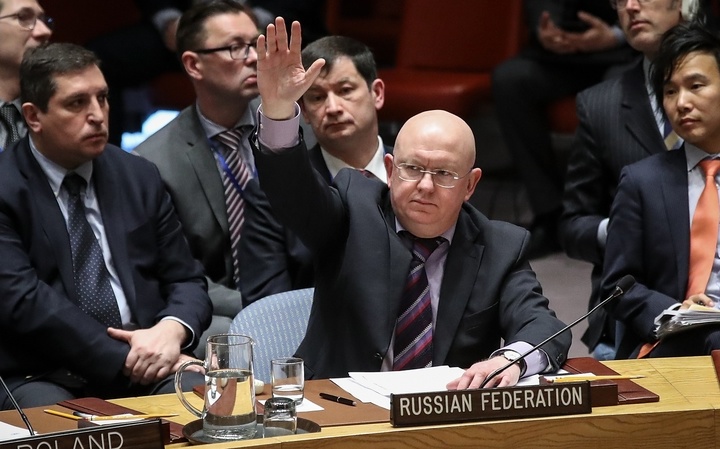Russia’s UN Ambassdor Vasily Nebenzya vetoes a resolution for an inquiry into chemical attacks in Syria, April 2018
Russia has moved to block a UN Security Council resolution for a ceasefire in opposition-held Idlib Province in northwest Syria.
Kuwait, Germany, and Belgium drafted the call for a halt to attacks, including the Russia-Assad regime offensive that has seized almost of northern Hama Province and part of southern Idlib Province. It has also killed more than 1,000 civilians, wounded thousands, and displaced more than 400,000 since late April.
At the end of August, Russian President Vladimir Putin declared a pause in the assault, but the Kremlin has been careful to reserve the right to resume the offensive against “terrorists”.
Rather than rejecting the ceasefire resolution outright, Russia — joined by China — have tabled an alternative. Its text sanctions the Russian-regime offensive by saying any resolution “shall not apply to military operations against individuals, groups, undertakings and entities associated with terrorist groups, as designated by the Security Council”.
Since its military intervention in September 2015 to prop up the Assad regime, Moscow has used the pretext of attacks on “terrorists” and Islamic State to bombard opposition territory, impose sieges, and pursue offensives to regain the areas.
Diplomats said the US and other states will push back Moscow, standing on the Kuwaiti-German-Belgian draft that “member states ensure that all measures taken to counter terrorism, including in Idlib Governorate, comply with their obligations under international law”.
The Security Council will vote on both drafts on Thursday.
Russia is almost certain to veto the version calling for a ceasefire. During the 102-month Syrian conflict, Moscow has vetoed 12 resolutions criticizing the Assad regime and/or pursuing a halt to regime attacks on civilians and opposition groups.
See also How Russia’s UN Vetoes Enabled Mass Murder in Syria
In early August, Panos Moumtzis, the UN’s humanitarian chief for Syria, said, “We have so far 39 health facilities, 50 schools, water points, markets, bakeries, and multiple civilian neighborhoods who have received a direct hit.”
Last week the 18th report by the UN Commission of Inquiry said Russia and the Assad regime may have committed war crimes with their attacks on civilian area, infrastructure, and crops, as well as stating, “In government-controlled areas, civilians, including recent returnees, have been arbitrarily arrested and detained, harassed, mistreated, and tortured.”
The UN estimates that about 3 million people — 20% of Syria’s remaining population — live in Idlib and northern Hama. About half of them had already been displaced from other areas of the country.


Who now is Comrade Trumpsky selling down the river to PutinKGB and others?
#AbuseofOffice
#Right2PrivacySafetyAndSecurity
#Accountability
#AnIndependentInvestigation
#ACitizensOversightCommittee
Afrin people reject Russian aid: We want our homeland, not alms
Afrin people living in Shehba have sent back a Russian aid convoy, saying; “We do not want alms, we want Afrin back”. […] The airspace over the western and northwestern parts of Syria, including Afrin, is controlled by Russia. With the opening of the airspace for the Turkish bombing and the withdrawal of Russian military from Afrin, Moscow in January 2018 gave the green light for the attack on the self-governing canton.
https://anfenglishmobile.com/rojava-syria/afrin-people-reject-russian-aid-we-want-our-homeland-not-alms-37704 9/17/2019
–
SDC Demands Damascus Recognizes the Autonomous Administration of North, East Syria
The Syrian Democratic Council (SDC), the political arm of the US-backed Syrian Democratic Forces (SDF), held Damascus liable for its failures and demanded moving towards decentralization of power as step towards sustainable peace. The SDC’s statements follow accusations by the Syrian foreign ministry [who] labeled the SDF as “separatist terrorist militias” in a letter to United Nations Secretary-General.
https://aawsat.com/english/home/article/1909631/sdc-demands-damascus-recognizes-autonomous-administration-north-east-syria 9/19/2019
–
Despite exclusion N, E of Syria, Guterres announced an agreement on constitution
UN Secretary-General António Guterres has announced that he has agreed to form a committee to draft a new constitution for the country, which he said was a key input to the political process of resolving the conflict. However, he did not address the exclusion of areas north and east of Syria, which make up about 30% of the country from the drafting committee.
https://hawarnews.com/en//haber/despite-exclusion-n-e-of-syria-guterres-announced-an-agreement-on-constitution-h11506.html 9/19/2019
–
French-German delegation visits the autonomous administration of northeastern Syria
The representatives of the Autonomous Administration asked the visiting delegation to support them in participating in the political process and the drafting of a new constitution for Syria, while the latter showed their support and willingness to transfer the demands of the Autonomous Administration to their governments.
https://npasyria.com/en/blog.php?id_blog=846&sub_blog=10&name_blog=French-German%20delegation%20visits%20the%20autonomous%20administration%20of%20northeastern%20Syria 9/19/2019
https://www.youtube.com/watch?v=cT4i0vnkK4o